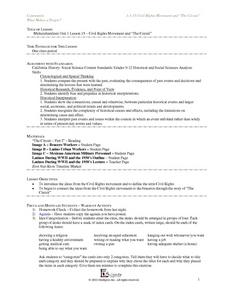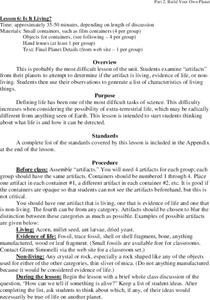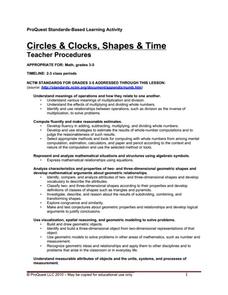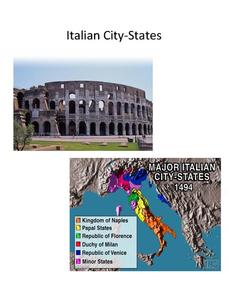Curated OER
Characteristics of Living Things
Seventh graders identify the characteristics of living and non-living things. In this biology lesson, 7th graders define vocabulary words as they go through the lesson. They answer a crossword puzzle after class discussion.
Curated OER
Expressing the Future
In thisfuture tense learning exercise, learners read the differences between expressing the future through present simple and present continuous verb forms.
Curated OER
Halloween Fine Arts Activities
Third graders demonstrate their understanding of crescendo. They achieve dramatic effect in singing the Halloween Song. They sing this song with a gradual crescendo from beginning to end.
Curated OER
Introduction to Genealogy
Students investigate their own family's genealogy by conducting oral interviews and doing Internet research. In a series of activities, students acquire inquiry and research skills, develop an appreciation of their heritage, and classify...
Curated OER
Charlotte's Web
Students examine the story, "Charlotte's Web" in the nine lessons of this unit. As the students progress through the book, they will explore the story plot, setting, character, and the value of friendship.
Curated OER
Rainforest Problem
Third graders use a hypothetical story in order to create a context for the lesson. The story presents a problem that needs to be solved. They write a letter to a government official as part of the lesson.
Curated OER
HALLOWEEN - HOLIDAY FINE ARTS ACTIVITIES
The pupils will demonstrate their understanding of crescendo; to achieve dramatic effect in singing the Halloween Song (basic technique used to provide mood in Music).
Curated OER
Lincoln, Patriotism and Protest
Eleventh graders explore arguments surrounding Abraham Lincoln's opposition to the Mexican War. They compare the arguments surrounding Lincoln's opposition to war with those surrounding war protestors during the Persian Gulf War in 1991.
Curated OER
Which Boundary Am I?
Sixth graders find 12 statements which describe the characteristics of the three boundary types, arranged in random order. Their task is to read each statement, and then CUT and PASTE it to the the appropriate boundary icon.
Curated OER
"The Circuit" and the Civil Rights Movement
Students compare and contrast concepts of the civil rights movement to the concepts presented in the short story, "The Circuit." In groups, they sort a series of ideas written on index cards into two categories - rights and freedoms. ...
Curated OER
What's on the Outside/Inside?
Students read about the idea of gender perspective in the writing of German history. They generate definitions from a list of given vocabulary words. They write definintions using their own words.
Curated OER
Is It Living?
Students investigate the definition of life and alive in the context of a unit that is involved with building their own planet. They participate in a class discussion about defining life, and in small groups analyze artifacts to...
Curated OER
Understanding Wilderness
Learners research and analyze an historical wilderness issue or event after discussing opinions on preservation of wilderness and key players and events in the history of wilderness preservation. After research is complete, students...
Curated OER
Old English: Pirate Slang
Students review a list of slang used by pirates and then compile a list of slang that they use in their everyday language. They discuss which examples of slang should be included in the dictionary and in which contexts slang is appropriate.
Curated OER
Dreaming of a Healthy City
Ninth graders design a healthy city. They identify the essential elements of a city and describe how climate and geography can determine the layout of a city. They create a blueprint of their design and share in small groups.
Curated OER
Desert Postcards
Students research characteristics of deserts. They present their findings in small groups to the class. Students utilize information learned about desert biomes, geography of the route of the Niger, and expeditions in their writing.
Curated OER
Memory and Legacy: Building Monuments and Memorials
Young scholars analyze the reasons why groups build monuments and memorials. Using the Holocaust as an example, they reflect on issues that are addressed in monuments related to it. They create a monument of their own and write an essay...
Curated OER
Water and Ice
Young scholars will work in small groups, observing an ice cube and recording a description, the feel of the ice, and how it looks when put in another container. Students observe changes in the ice over 15 minute intervals, then freeze...
Curated OER
Circles and Clocks, Shapes and Time
Students work in groups to research clocks and practice telling time. In this telling time lesson, students use the computer program ProQuest to study circles, including radius and diameter, and practice drawing circles using a compass....
Curated OER
Creating Nonviolence: A Theatre of the Oppressed Approach to Things Fall Apart
Eleventh graders analyze Ahimsa and complete activities for nonviolence. In this nonviolence lesson, 11th graders define violence and relate it to their lives. Students adapt prose into a dialogue to act out and analyze the violence in...
Curated OER
Penny Moves
Students explore math functions by completing a worksheet in class. In this spatial movement lesson, students utilize a four square grid and a penny to practice moving the coin horizontally, vertically and diagonally as instructed....
Curated OER
The Big E
Sixth graders explore predictions and estimation. In this math lesson plan, 6th graders analyze data and make predictions based on the past years data.
Curated OER
African Art and Personal Adornment
Students explore the concept of personal adornment. They view and compile a list examples and compare personal adornment in American culture to that in African culture.
Curated OER
Italian City-States
Check out this packet of worksheets involving mapping activities, vocabulary logging, reading and comprehending informational texts, etc., which focuses on Italian city-states during the fourteenth and fifteenth centuries. There are also...























